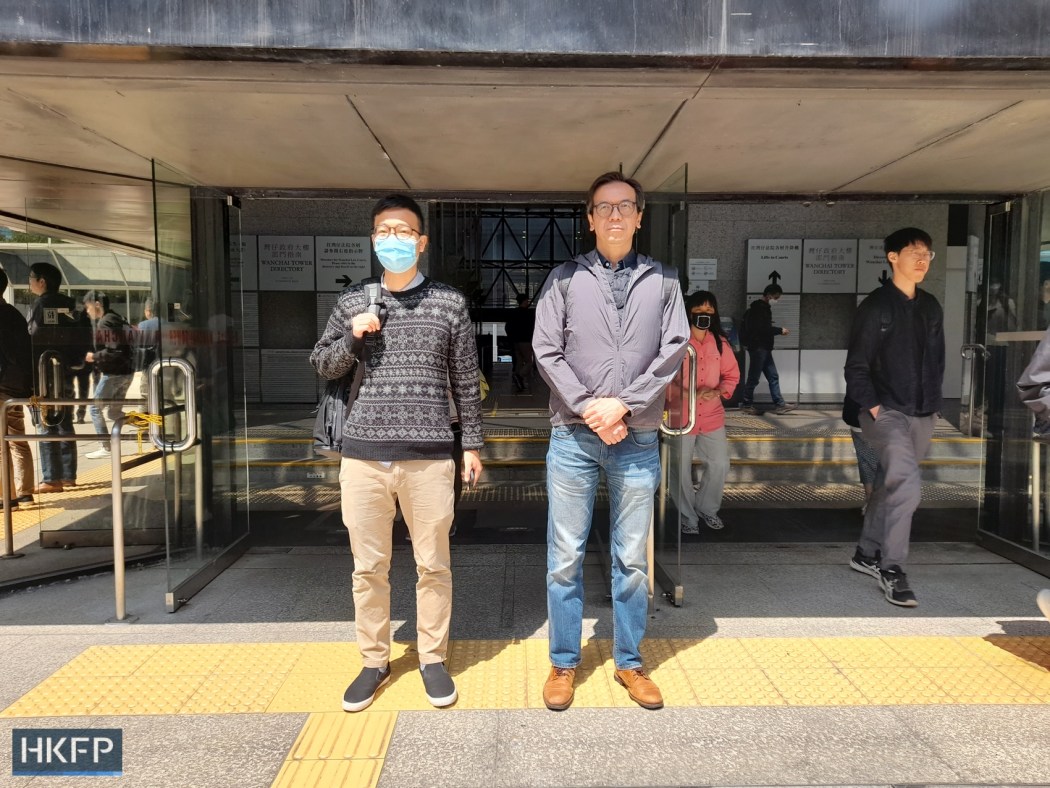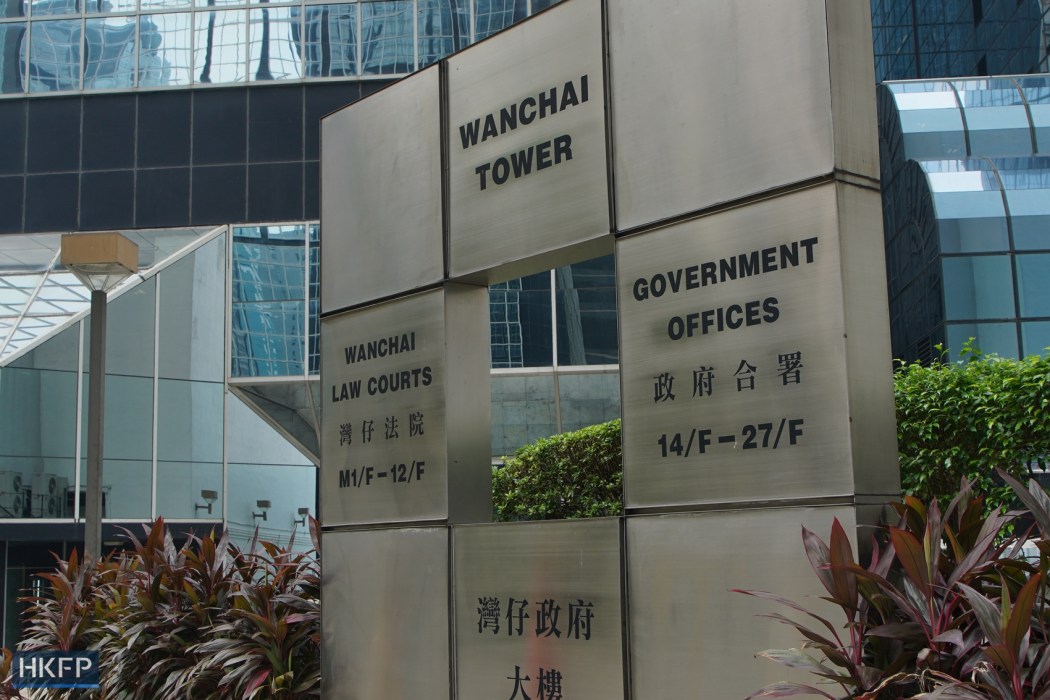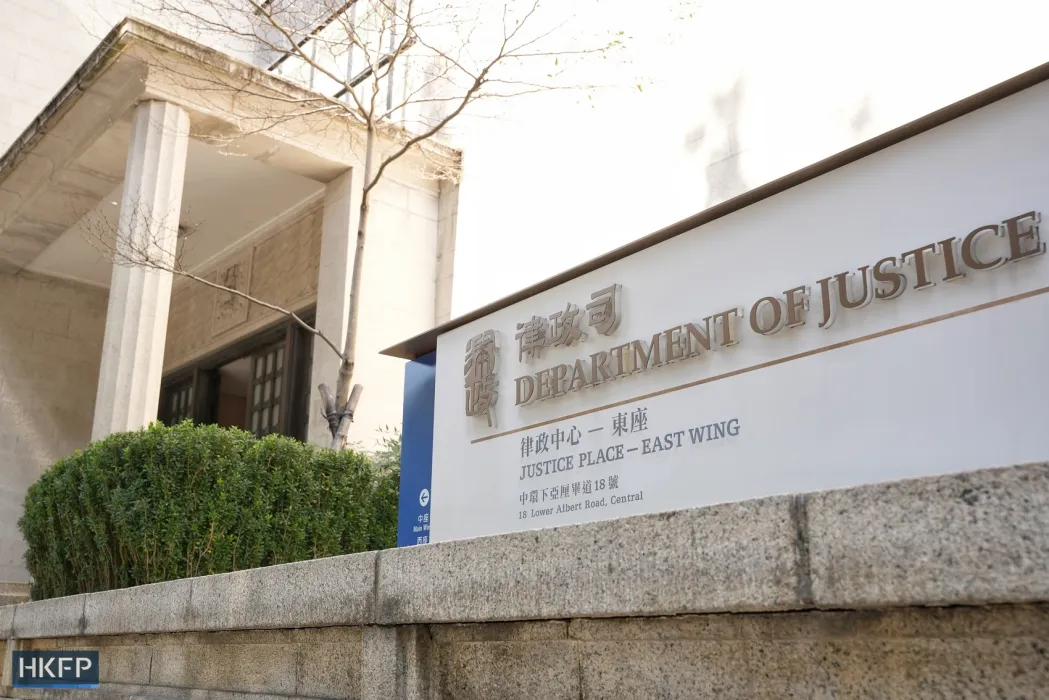The lead prosecutor in the sedition trial against the defunct online media outlet Stand News has said calls to end China’s one-party dictatorship were “obviously” unlawful after the country amended its constitution five years ago.

During Monday’s hearing, lead prosecutor Laura Ng questioned the former chief editor of Stand News, Chung Pui-kuen, in front of District Judge Kwok Wai-kin about an opinion piece written by veteran journalist Allan Au and published by Stand News on June 1, 2021.
Chung, the outlet’s former acting chief editor Patrick Lam and its parent company stand accused of conspiring to publish 17 “seditious” articles between July 2020 and December 2021.
In the commentary, one of the 17 articles in question, Au wrote that “shouting out the slogan ‘end one-party dictatorship’ will create a great opportunity for [others] to accuse you of inciting [subversion].”
The slogan Au referred to was one of the five missions of the disbanded Hong Kong Alliance in Support of Patriotic Democratic Movements of China (HKA). The organisation and three of its members have been charged with incitement to commit subversion under the national security law.
Citing how China’s constitution was amended in 2018 to make the Chinese Communist Party’s leadership “the defining feature of socialism with Chinese characteristics,” Ng said calls to overthrow the party were obviously violating the law.
However, Chung said he did not think the slogan itself was illegal as it was a political demand that could be achieved by lawful and peaceful means, such as making amendments to the constitution.

The editor added that criticism of China’s system had been allowed in Hong Kong for a long time after the city’s Handover from British to Chinese rule in 1997. “The HKA had been chanting the slogan for decades. I think it is something that is of course tolerable under freedom of expression,” he added.
In response, Ng said the charge against HKA and its members was not only based on the slogan itself, but their “various means” to push the mission forward after the national security law was imposed on Hong Kong, and such details were not shown in Au’s op-ed.
Ng said these approaches included publishing posts on different social media platforms, hosting events, publishing articles, attending media interviews, holding demonstrations and the annual Tiananmen Crackdown vigil, as well as promoting their ideas at Lunar New Year fairs.
But Chung said he did not consider those actions unlawful, adding that he did not think Au’s commentary was without foundation in fact, either.
“The author obviously saw that different sources, opinion leaders and state-backed media outlets were making accusations against the HKA, and particularly targeting its mission to end one-party dictatorship,” Chung said.
The prosecutor also questioned why Au wrote “patriots think speeches they don’t like are offensive and see offensive speeches as incitements.”
Chung answered that Au was talking generally about the situation of Hong Kong’s civil society ahead of June 2021, when pro-establishment opinion leaders and state-backed media outlets were often critical of dissenting groups and individuals.

“When accusations that non-pro-establishment groups are inciting subversion are raised at every turn… I would describe it as white terror,” Chung said.
The prosecutor said it was wrong for Au to make the slogan the single focus in the case of the Alliance. “When comprehensive facts are not disclosed, the public can easily be misled,” Ng added.
Chung said he disagreed with the prosecutor.
‘Infinite’ power expansion
Ng also questioned Chung over another op-ed by Au published on February 2, 2021, which was also part of the sedition charge.
The main accusation against the piece in question, she said, was that it incited hatred of the judiciary.
Ng said the op-ed said that the Beijing-imposed national security law had “infinitely expanded the power” of the police and prosecutors by frequently using open-ended words like “other” or “including” in its descriptions of offence details or powers of enforcement.
However, the prosecutor said “readers would not think [the national security law] is all-encompassing” had Au presented the context provided in the legislation, adding that other local legislations also used the same words, and that did not mean an expansion of the power of prosecutors or police.

In response, Chung said people had found that decisions made by government lawyers or the courts since the imposition of the security law different: “their powers have, in fact, expanded.”
Additionally, the editor said an opinion piece had to simplify matters as it was impossible to copy the entire written legislation.
“If you think that he has misunderstood anything, you can discuss, debate and explain it and the government can make clarifications. It does not mean that he has the intention to incite the hatred or disregard of the judiciary,” Chung said.
“I am very confused and worried that you want to restrict opinion writing in Hong Kong by picking on every line [of a commentary] during this prosecution,” he added.
Factual basis
Ng also asked if Au’s commentary had any factual basis, as the writer said government lawyers “remained silent” when the court handed down light sentences in cases where police officers were the offenders.
She said the Department of Justice (DOJ) had appealed against the sentencing decisions Au mentioned in his piece, and the Court of Appeal had ruled in favour of the prosecutors after Au’s op-ed was published.
“Of course you might not be wrong to say these things on February 22, but then the DOJ was made a scapegoat?” Ng asked.
Chung answered that it was “quite common” at the time to think that the prosecution had double standards towards police officers and that this view was not unique to the author.
Chung said that he, as an editor, would not censor these views if the writer’s points were based on facts and the opinion was widely held, although the author’s analysis or judgement might not have been correct.

Citing the rise in doxxing, and intimidating letters or phone calls targeting judges since 2019, Ng asked if Chung agreed that any untruthful accusations made against judges or the judiciary would further damage public trust in the rule of law, which had declined after the anti-extradition bill unrest.
However, Chung said people’s confidence might have risen if the government had been able to provide a persuasive response after these accusations entered public deliberation.
On the contrary, he said the government would not have the opportunity to respond if public debates were banned, meaning that such accusations could take root in people’s perceptions, regardless of whether they were true or not.
Chung said he thought Au’s op-ed reflected the worries of “not a small number of people” and he disagreed with the prosecution’s accusation that it would arouse readers’ hatred towards the judiciary under the social atmosphere after the 2019 protests.
The hearing will continue on Thursday.
Non-profit digital news outlet Stand News ceased operations and deleted its website in December 2021 after its newsroom was raided by over 200 national security police officers. Seven people connected to the independent outlet were arrested on suspicion of conspiring to “publish seditious publications.” However, only ex-chief editor Chung Pui-kuen, acting chief editor Patrick Lam and parent company Best Pencil (Hong Kong) Limited were charged under the colonial-era law.
The 17 allegedly seditious Stand News articles – click to view
- Profile of Gwyneth Ho, a candidate in the 2020 legislative primaries held by the pro-democracy camp, published on July 7, 2020.
- Profile of Owen Chow, a candidate in the 2020 legislative primaries held by the pro-democracy camp, published on July 27, 2020.
- Profile of Fergus Leung, a candidate in the 2020 legislative primaries held by the pro-democracy camp, published on August 12, 2020.
- Commentary by Chan Pui-man, Apple Daily’s former associate publisher, criticising speech crimes, published on September 12, 2020.
- Commentary by Nathan Law, a former lawmaker now in self-exile, on “how to resist” under the national security law, published on September 20, 2020.
- Profile of Law on his “battlefront” of calling for sanctions on the Hong Kong government in the UK, published on December 9, 2020.
- Commentary by Law on “resilience in a chaotic world,” published on December 13, 2020.
- Feature interview with Ted Hui, a former lawmaker in self-exile, after he fled Hong Kong with his family, published on December 14, 2020.
- Feature interview with Baggio Leung, a former lawmaker in self-exile, as he called for sanctions on Hong Kong and a “lifeboat scheme for Hongkongers,” published on December 15, 2020.
- Commentary by Sunny Cheung, an activist in self-exile, responding to being wanted by the Hong Kong government, published on December 28, 2020.
- Commentary by Allan Au, a veteran journalist, on “new words in 2020,” which included “national security,” “disqualified” and “in exile,” published on December 29, 2020.
- Commentary by Au calling a national security trial a show, published on February 3, 2021.
- Commentary by Law paralleling the mass arrests of candidates in the democrats’ primaries to mass arrests during Taiwan’s white terror period, published on March 2, 2021.
- Commentary by Au accusing the authorities of “lawfare” in usage of the sedition law, published on June 1, 2021.
- Commentary by Au describing Hong Kong as a disaster scene after the implementation of national security law, published on June 22, 2021.
- Feature about CUHK graduates’ march on campus to mourn the second anniversary of the police-student clash in 2019, published on November 11, 2021.
- Report on Chow Hang-tung’s response to being honoured with the Prominent Chinese Democracy Activist award, published on December 5, 2021.
Advocacy groups, the UN, and western countries criticised the arrests as a sign of declining media freedoms, whilst now-Chief Executive John Lee condemned “bad apples” who “polluted” press freedom following the raids. The trial began in October 2022 with the court considering 17 allegedly seditious articles, including interviews, profiles, hard news reporting and opinion pieces. Sedition is not covered by the Beijing-imposed security law and carries a maximum penalty of two years behind bars.
Support HKFP | Policies & Ethics | Error/typo? | Contact Us | Newsletter | Transparency & Annual Report | Apps
Help safeguard press freedom & keep HKFP free for all readers by supporting our team
























